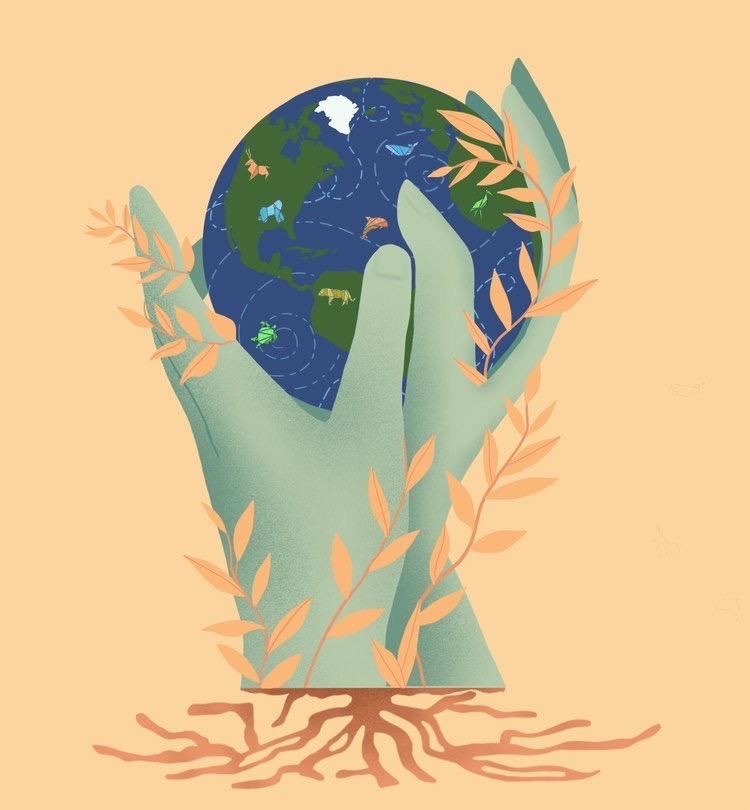It All Depends: Nature's Last Call

Illustration by Imy George @imysketchysketchy.
“It is easy to forget that we are also a part of nature.” So mourns the evergreen naturalist, Sir David Attenborough, introducing his new film, “David Attenborough: A Life on our Planet.” The film conflates human-induced climate change with biodiversity loss, and the destruction wrought on this “finely tuned life support machine.” Altogether, global populations of wild animals have plunged by 68% since 1970. So widespread is humanity’s ecological destruction that some scientists propose “the Anthropocene,” a geological epoch charting irreversible human impact on Earth, has begun. Sir David, though, believes “if we act now, we can yet put it right.”
Like the environment itself, the topic is well-worn. Current commitments to the 2015 Paris agreement will sustain a 3°C (37.4°F) global temperature rise, precipitating swathes of extreme weather. According to a recent You Gov poll, only 14% of the British population believe climate change should top government agenda. With 20,000 fires engulfing the Amazon over the first half of September, a lingering complacency regarding the desiccation of ecosystems and tarnished tropics has become untenable. Sir David’s reminder of our forgotten symbiosis with the biosphere rings increasingly true. The problem, then, is closer to home: we define ourselves as separate from the world.
In the West, philosophers have traced the exploitative environmental ethos back to the medieval anthropocentric idea basing humans, endowed with superiority over other species, at the centre of the universe. The ‘conquest of nature,’ then, implies a felt separation between the conqueror and the conquered.
Outside looking in
Buddhist philosophy says otherwise. The first ruler in history to endorse conservational measures, the Indian emperor Ashoka Maurya (304-232 BCE), was Buddhist. The noted lack of explicit environmental guidance in Buddhist literature, though, has more to do with the disparity between Buddhist thought and Western environmental ethics. Central to this discord is the Buddha’s distinction of “ultimate reality” and “conventional reality.” Conventional reality is the way things appear as independent entities, comprising the perceptibly different objects, organisms and ecosystems of the world.
The first conventional entity to notice, the Buddha stated, is the self. Personal identity is tethered to the basic sensation that we are a separate centre experiencing an external world. This is anchored by criteria including our name, occupation, nationality, possessions, and the like. However, Buddhist philosophy renders things conventional by “dependent origination,” that is, things are wholly dependent on other so-called things for their existence.
Not the only pebble
Ecologically, this concept is analogous to a rock pool. A rock pool’s existence is contingent on whether the tide is in or out. The tide itself is dependent upon the moon’s gravitational pull, and so on ad nauseum. Even during an outbound tide, the pool is an amalgam of specifically arranged rocks, seaweed, living organisms, sand, and so forth – none of which individually constitute the rock pool. It is only when such aspects are suitably arranged so as to comply with linguistic utility that ‘a rock pool’ is designated. Ultimately, there is no intrinsically abiding entity, it is conventional. It is subject to, the Buddha would say, infinitely contingent external conditions.
If the self is seen equivalently, to what extent are we separate from our environment? Our name, body composition, nationality, language and the like, are all dependent features we did not choose. Our occupation, possessions, values and physical appearance are all impermanent and contingent. According to orthodox Buddhism, even the felt sense of being an individuated awareness is no more than a series of transient impressions without a fixed substrate.
On this view, the presupposition that humanity somehow stands outside the interconnected ecological web is to be blind to the inseparability of person and environment. It is one thing to grasp this intellectually; it is another, viscerally. Reversing this core disharmony may catalyse the most inviolable philosophy for actionable sustainability. Nature depends, therefore, on the realisation that we depend on it. This relationship, Sir David reiterates, “is fundamental to our survival.”
